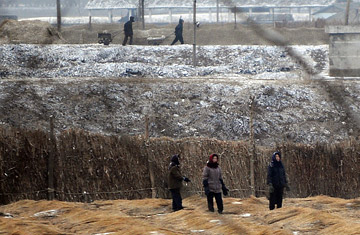
North Korean farmers work in their fields outside the North Korean capital of Pyongyang, February 25, 2008.
(2 of 2)
Indeed, despite the mounting evidence of trouble on the North Korean farm, Kim refused to request more handouts from Seoul, and turned instead to China for additional food supplies. But the global run-up in food prices has hamstrung Beijing's response. Starting in December 2007, as public discontent about rising food prices in China grew, Beijing implemented a series of measures to reduce its grain exports. Among other things, it eliminated a 13% tax rebate on grain exports. Since a substantial portion of Chinese-grown rice and grains go to the North on commercial terms — Beijing's overall agricultural trade and aid to Pyongyang is an official state secret, so no one knows precisely how much — those policy changes hurt overall food supply in the North, and also helped continue to drive up food prices in the country.
In fact, the Peterson Institute's study — which includes a survey of 1,300 refugees from the North living in China — shows that the North has been as vulnerable to rising food prices as anyone else on the globe. (Starting in 2002 the regime allowed market prices for food to prevail for much of the country, though the military and government workers continue to get subsidized food supplies). The result, according to the "fragmentary" evidence compiled by the Peterson Institute, has been a tripling of food prices just in the last year — a run-up so sharp that it signals the panic buying often associated with pre-famine conditions.
Diplomatic and NGO sources in Seoul now say that Beijing has begun to move to address the emerging North Korean shortages. In March and April it donated at least 50,000 metric tons of food aid to Pyongyang. With the Olympics in August and a crackdown on North Korean refugees sneaking into China already well under way, Beijing wants nothing to do with the exodus from the North a growing food crisis would inevitably spur.
How bad might it get in North Korea? Most aid workers in Seoul believe that the current shortages won't equal the famine of the 1990s, in part because this time the outside world has been alerted to the deteriorating conditions sooner than it was a decade ago. But, as Noland points out, North Korea not only needs immediate food assistance, it needs to import a significant amount of fertilizer or it risks another bad harvest this year, further compounding the deepening food problem. (After the North's nuclear test in the fall of 2006, South Korea stopped supplying fertilizer, which had been a key component of its aid to Pyongyang). Among the steps Pyongyang urgently needs to take now, Noland and others believe, are to conclude negotiations for expanded aid from the World Food Program. (Pyongyang sharply curtailed the activities of the organization following a rare bumper crop in the North three years ago.) Kim also has to swallow his pride and ask the South to restart the flow of food assistance to the North.
Seoh Jae-jean, Director for NK Studies Division at Seoul's Korea Institute for National Unification, also believes that Pyongyang's recent "crackdown on black markets" has exacerbated shortages. "If they leave people alone, people will find ways to survive with agility and flexibility. The government's attempt to control the private market is making matters worse," he says. But leaving people in his own country alone has never been Kim Jong Il's strong suit. Letting them suffer and, in the past, starve to death, has been his inclination. Will 2008 be different? With Stephen Kim/Seoul
